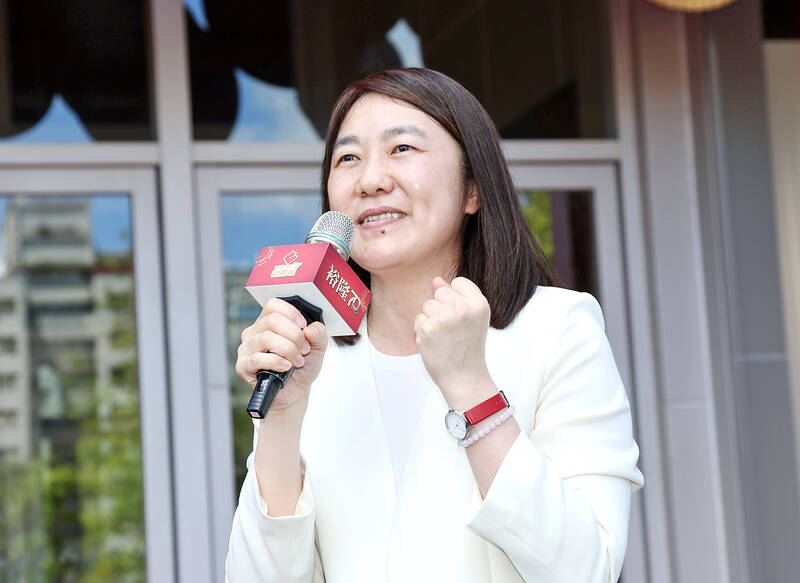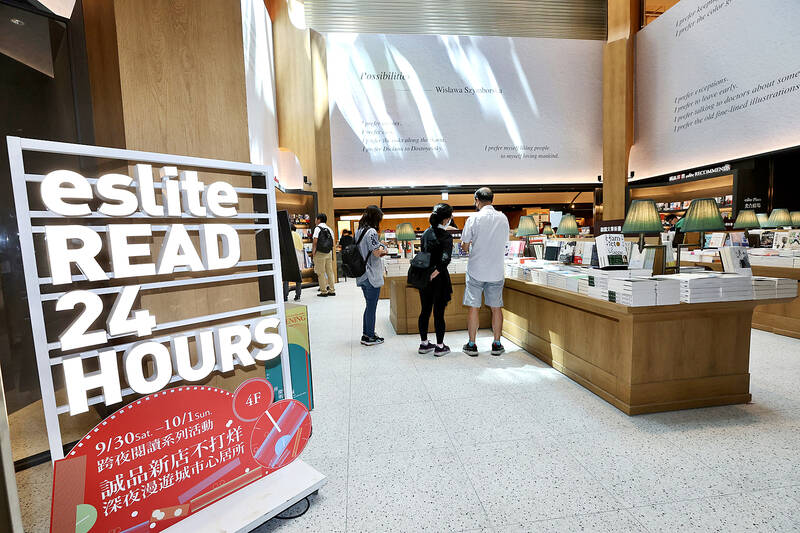Eslite Spectrum Corp (誠品生活) yesterday held a grand opening for a new department store in New Taipei City’s Sindian District (新店) that is the largest in Asia by floor space and would help the leisure lifestyle services provider swing into profit next year.
The new outlet, Eslite Spectrum Sindian, has almost 20,000 ping (66,000m2) of floor space that might generate annual revenue of NT$4 billion to NT$5 billion (US$123.96 million to US$154.95 million) by housing 250 retail brands including 20 themed restaurants to meet the entertainment needs of people in neighboring areas, Eslite Spectrum chairwoman Mercy Wu (吳旻潔) said.
The number of visits turned out higher than expected during the soft opening, giving Eslite Spectrum the confidence to aim high, Wu said.

Photo: CNA
Eslite Spectrum, which operates Eslite Bookstore (誠品書局) and Eslite Hotel (誠品行旅), as well as supplies kitchen equipment and wines, has not yet emerged from COVID-19 pandemic-related losses.
Things should improve next quarter and turn a new page next year with help of the Sindian property and forthcoming outlets in Kaohsiung and Taichung, Wu told reporters.
The Sindian branch takes up partial floors of Yes, Life Yulon City (裕隆城), a mixed-use complex owned by Yulon Motor Co (裕隆汽車).

Photo: CNA
Wu said Yulon invited Eslite to help convert the massive plot of land into a mixed-use complex in 2013, and she was in talks with more than 2,000 retail brands and restaurants to make a presence in the property.
The department store’s location in New Taipei City made luxury brands impractical partners, and Eslite Spectrum had to focus on community-minded shops and eateries instead, Wu said.
“We have to adjust and drop our past preference for lesser-known brands and collaborate with Uniqlo, Niko, Nike and other popular fashion and sports brands to satisfy the needs of different customer groups,” Wu said.
Toward the end, the company also believed there must be sufficient dining options that could account for up to 40 percent of the space, she said.
Still, Eslite Spectrum has set aside generous space for book collections that are as large and diverse as in the Eslite bookstore across from National Taiwan University, Wu said, adding that the bookstore would organize exhibitions and events to entertain customers.
In addition, Vieshow movie theaters are occupying the sixth to eighth floors and could seat 2400 people, according to Yes, Life Yulon City data.
The Yulon Group is seeking to add high-rise residential buildings in the complex to make the best use of its space.

South Korea’s equity benchmark yesterday crossed a new milestone just a month after surpassing the once-unthinkable 5,000 mark as surging global memory demand powers the country’s biggest chipmakers. The KOSPI advanced as much as 2.6 percent to a record 6,123, with Samsung Electronics Co and SK Hynix Inc each gaining more than 2 percent. With the benchmark now up 45 percent this year, South Korea’s stock market capitalization has also moved past France’s, following last month’s overtaking of Germany’s. Long overlooked by foreign funds, despite being undervalued, South Korean stocks have now emerged as clear winners in the global market. The so-called “artificial intelligence

‘SEISMIC SHIFT’: The researcher forecast there would be about 1.1 billion mobile shipments this year, down from 1.26 billion the prior year and erasing years of gains The global smartphone market is expected to contract 12.9 percent this year due to the unprecedented memorychip shortage, marking “a crisis like no other,” researcher International Data Corp (IDC) said. The new forecast, a dramatic revision down from earlier estimates, gives the latest accounting of the ongoing memory crunch that is affecting every corner of the electronics industry. The demand for advanced memory to power artificial intelligence (AI) tasks has drained global supply until well into next year and jeopardizes the business model of many smartphone makers. IDC forecast about 1.1 billion mobile shipments this year, down from 1.26 billion the prior

Chinese artificial intelligence (AI) start-up DeepSeek’s (深度求索) latest AI model, set to be released as soon as next week, was trained on Nvidia Corp’s most advanced AI chip, the Blackwell, a senior official of US President Donald Trump’s administration said on Monday, in what could represent a violation of US export controls. The US believes DeepSeek will remove the technical indicators that might reveal its use of American AI chips, the official said, adding that the Blackwells are likely clustered at its data center in Inner Mongolia, an autonomous region of China. The person declined to say how the US government received

People stand in a Pokemon store in Tokyo on Thursday. One of the world highest-grossing franchises is celebrated its 30th anniversary yesterday.